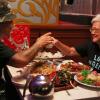5 Ways You Can Be a Better Chinatown Visitor

When Sissy Trinh was a kid, she would tag along with her father ("a very chatty person," she says) to all kinds of restaurants, from Salvadoran to Caribbean joints, where he would make an extra effort to converse with others even if he didn't speak the same language fluently.
"He knew how to say things like, 'hola' and 'gracias,' and said that with a Vietnamese accent on top," Trinh, 47, recalled. "It was just that wanting to engage and ask questions."
In those experiences, Trinh learned how to relate to other people. Today, she heads the Southeast Asian Community Alliance (SEACA) in Chinatown. It's a nonprofit that empowers local Southeast Asian communities through many channels: educating the youth about leadership and community organizing, and advocating for groups in regards to socio-economic and racial justice issues.
Based on her community engagement and spending a great deal of time in Chinatown, Trinh shares some of her ideas on how people can be better Chinatown visitors in supporting businesses.
Leave your assumptions and stereotypes at the door.
"I hear people complaining, 'The produce is bad and dirty.' There are a lot of presumptions that Chinese food is cheap and low quality. And there's not a sense of curiosity, there's not a sense of wanting to engage," Trinh said.
She suggests visitors come into the community with a sense of intellectual curiosity. It could be something as simple as starting a conversation, or asking a restaurant owner what their specialty is.
Manage your expectations and treat these businesses as mom-and-pop shops.

"Because a lot of Chinatown restaurants are small, immigrant- and family-owned, it takes a bit more effort to build that relationship with them because these people don't necessarily speak English as well as someone at a P.F. Chang's," Trinh said. "And they're not going to have the same level of time and energy to provide this level of service that you would want."
When she goes to restaurants like these, she doesn't expect that she's going to get the level of service typical of newer, more modern hotspots around town, but she does go there because she knows she's going to get the best noodles, as an example. If she's looking for an experience with high-end service, then she'll go to a fancier place.
"You have to understand and manage your expectations based off of what type of place you're going to," she said.
Try different things.

Trinh recommends stepping outside of your comfort zone and trying different things even if you're a creature of habit and always want to get that plate of General Tso's chicken or sweet and sour pork. And if the item you ordered doesn't turn out great, learn to be okay with it because a lot of the dishes are usually cheap enough that you can try something different the next time, she said. Every restaurant has its own specialty, and you'll need to experiment to find out what that is.
She also says it's easy to make multiple stops on one trip. "There are times when I might, on any given day, go to three or four different places," Trinh said. "I'll grab lunch at one place, I'll get a boba drink at another, and then I'll stop and get some groceries at a third. And that's all in a half hour. It's about not stressing out about if you're going to have a great meal because you can always try another one."
Play to the strengths of the neighborhood.
There's a historical and cultural context to every neighborhood. Trinh will hear people complain about how Chinese food should be under a certain price range because it's low quality, or that Chinatown isn't authentic.
"Part of the problem is people think the Chinese are monolithic," Trinh said.
She sees that people expect Chinatown to be the same as the San Gabriel Valley (SGV) — and often compare the two. The SGV has a more diverse Asian population than Chinatown, which is mostly made up of Cantonese and Toisanese people (who are from the Guangdong province of China).
"Play to the strengths of the neighborhood," Trinh said. "I don't really eat Chinese food on the Westside, so why would you complain that there's not good Szechuan food in Chinatown? It's a different kind of cuisine, right?"
Think of Chinatown as someone's home and you're a guest.

Trinh suggests being thoughtful when you're in Chinatown because it is someone's home, whether they're vending on the streets, running a business or living there as a resident.
"How would you behave? You would come in with a sense of respect and gratitude, right? And you would come in with a sense of openness if someone was inviting you to their home for things like Christmas dinner. You're not going to come in and be like treating them like they're your servant. Yes, you're coming in and maybe spending money, but you're still a guest, and these are people who deserve to be treated with respect."
She's not saying you have to go out of your way to do a grand gesture, but it's the simple things like being nice and polite. She talks about how sometimes visitors will freak out and call police, report a business for not living up to their cleanliness standards or write bad Yelp reviews that really hurt a business.
"You get to go home at the end of the day, whereas this community is the one that has to deal with the over-policing that you created," Trinh said. "There are lots of things and places that I don't like, but I don't blast it all over social media."





